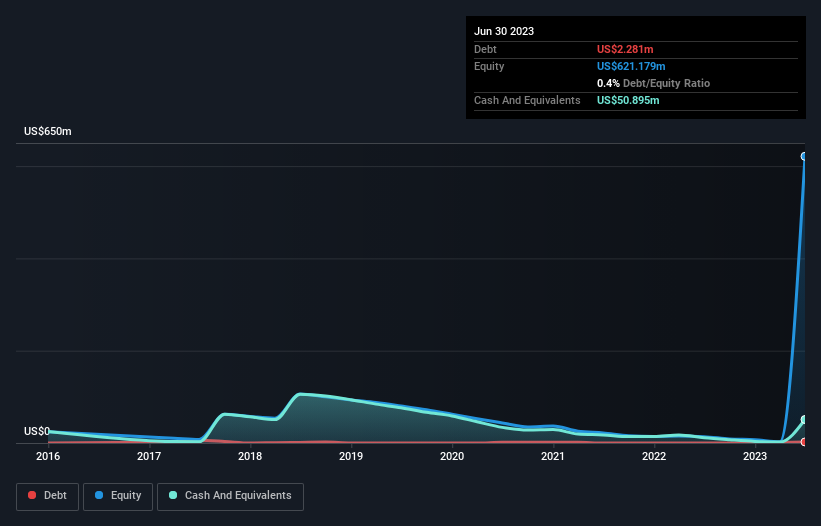Howard Marks put it nicely when he said that, rather than worrying about share price volatility, 'The possibility of permanent loss is the risk I worry about... and every practical investor I know worries about.' So it might be obvious that you need to consider debt, when you think about how risky any given stock is, because too much debt can sink a company. Importantly, Cibus, Inc. (NASDAQ:CBUS) does carry debt. But the more important question is: how much risk is that debt creating?
What Risk Does Debt Bring?
Debt is a tool to help businesses grow, but if a business is incapable of paying off its lenders, then it exists at their mercy. If things get really bad, the lenders can take control of the business. However, a more common (but still painful) scenario is that it has to raise new equity capital at a low price, thus permanently diluting shareholders. Of course, debt can be an important tool in businesses, particularly capital heavy businesses. The first step when considering a company's debt levels is to consider its cash and debt together.
See our latest analysis for Cibus
How Much Debt Does Cibus Carry?
The image below, which you can click on for greater detail, shows that at June 2023 Cibus had debt of US$2.28m, up from none in one year. However, its balance sheet shows it holds US$50.9m in cash, so it actually has US$48.6m net cash.

A Look At Cibus' Liabilities
Zooming in on the latest balance sheet data, we can see that Cibus had liabilities of US$22.4m due within 12 months and liabilities of US$170.6m due beyond that. On the other hand, it had cash of US$50.9m and US$858.0k worth of receivables due within a year. So its liabilities outweigh the sum of its cash and (near-term) receivables by US$141.3m.
While this might seem like a lot, it is not so bad since Cibus has a market capitalization of US$353.6m, and so it could probably strengthen its balance sheet by raising capital if it needed to. However, it is still worthwhile taking a close look at its ability to pay off debt. Despite its noteworthy liabilities, Cibus boasts net cash, so it's fair to say it does not have a heavy debt load! When analysing debt levels, the balance sheet is the obvious place to start. But ultimately the future profitability of the business will decide if Cibus can strengthen its balance sheet over time. So if you want to see what the professionals think, you might find this free report on analyst profit forecasts to be interesting.
Given its lack of meaningful operating revenue, Cibus shareholders no doubt hope it can fund itself until it has a profitable product.
So How Risky Is Cibus?
Statistically speaking companies that lose money are riskier than those that make money. And the fact is that over the last twelve months Cibus lost money at the earnings before interest and tax (EBIT) line. Indeed, in that time it burnt through US$23m of cash and made a loss of US$33m. However, it has net cash of US$48.6m, so it has a bit of time before it will need more capital. Overall, we'd say the stock is a bit risky, and we're usually very cautious until we see positive free cash flow. The balance sheet is clearly the area to focus on when you are analysing debt. But ultimately, every company can contain risks that exist outside of the balance sheet. For example, we've discovered 5 warning signs for Cibus (4 are significant!) that you should be aware of before investing here.
At the end of the day, it's often better to focus on companies that are free from net debt. You can access our special list of such companies (all with a track record of profit growth). It's free.
New: AI Stock Screener & Alerts
Our new AI Stock Screener scans the market every day to uncover opportunities.
• Dividend Powerhouses (3%+ Yield)
• Undervalued Small Caps with Insider Buying
• High growth Tech and AI Companies
Or build your own from over 50 metrics.
Have feedback on this article? Concerned about the content? Get in touch with us directly. Alternatively, email editorial-team (at) simplywallst.com.
This article by Simply Wall St is general in nature. We provide commentary based on historical data and analyst forecasts only using an unbiased methodology and our articles are not intended to be financial advice. It does not constitute a recommendation to buy or sell any stock, and does not take account of your objectives, or your financial situation. We aim to bring you long-term focused analysis driven by fundamental data. Note that our analysis may not factor in the latest price-sensitive company announcements or qualitative material. Simply Wall St has no position in any stocks mentioned.
About NasdaqCM:CBUS
Cibus
An agricultural biotechnology company, develops and licenses gene edited plant traits using gene editing technologies to enhance farming productivity or produce renewable low carbon plant products.
Moderate risk with limited growth.
Similar Companies
Market Insights
Community Narratives




